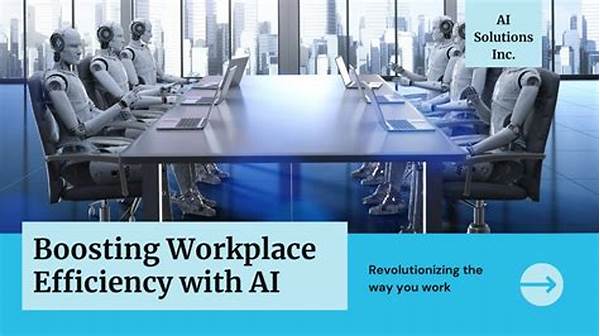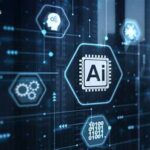- The Global Impact of AI on Workplace Efficiency
- The Goals of AI-Enhanced Workplace Efficiency
- Transforming Employee Roles with AI
- Bridging Global Teams and Resources
- Exploring the Benefits of AI in Workplace Efficiency
- Ten Tips for Maximizing AI’s Efficiency Boost
- Unveiling the Future Role of AI in Workplace Dynamics
Sure! Here is an article with the requested structure and style:
Read More : Best Ai Tools For Data Analysis In 2025
—
In today’s rapidly evolving business landscape, the integration of artificial intelligence (AI) into the workplace has transitioned from a novelty to a necessity. Companies worldwide are embracing AI technologies to streamline operations, enhance productivity, and foster innovation. Imagine having a digital assistant by your side, simplifying monotonous tasks and providing insightful data analysis — allowing you to focus on strategic, creative activities that truly require your human touch. As AI continues to advance, it plays a pivotal role in reshaping the future of work, making it more efficient and agile than ever before. But how exactly does AI achieve this remarkable feat? Let’s delve into its transformative influence on global workplace efficiency, discovering the unique potential it holds for organizations eager to stay ahead in the competitive market.
The boost AI provides to workplace efficiency worldwide is a testament to its multifaceted capabilities. AI algorithms refine data sorting processes, predict industry trends, and enhance decision-making accuracy. For instance, AI tools can process vast amounts of data far beyond human capability, identifying patterns and insights that guide strategic business decisions. This not only saves time but significantly enhances the quality and outcome of these decisions. Moreover, AI’s impact on improving employee satisfaction by reducing workload stress and repetitive task fatigue is a game-changer.
AI contributes to workplace efficiency by automating routine tasks, thus freeing up employee time. Applications such as chatbots handle basic customer service inquiries, leaving human agents to manage more complex issues. Automated scheduling and resource management systems ensure teams operate smoothly and without unnecessary delays. By taking on these operational burdens, AI allows employees to invest more energy into innovative and essential projects, stimulating overall business growth.
Globally, industries are witnessing a paradigm shift in how operations are conducted, thanks to AI. From virtual collaboration tools to AI-driven project management software, technology fosters better communication and streamlined workflows across international teams. Such advancements are transforming traditional business models at every level, from small startups to multinational conglomerates, ultimately enhancing efficiency and effectiveness in a sustainable, impactful manner.
The Global Impact of AI on Workplace Efficiency
With the increasing reliance on AI technologies, many businesses are reaping the benefits of enhanced operational efficiency and adaptability. AI’s ability to learn and adapt improves over time, providing even more robust solutions that align with an organization’s evolving needs. Let’s explore these impacts more closely and understand how AI boosts workplace efficiency worldwide as we transition into a new era of work.
—
The Goals of AI-Enhanced Workplace Efficiency
In a world where time is money, businesses continuously strive for greater efficiency and productivity. Enter AI, a transformative force that not only envisions a futuristic workplace but turns it into reality. So, what are the objectives behind integrating AI into the workplace, and how do these goals contribute to efficiency worldwide?
First and foremost, AI aims to streamline processes. By automating repetitive and mundane tasks like data entry, inventory management, and basic correspondence, AI frees up human capital, allowing employees to focus on creative and strategic endeavors that drive innovation. This not only enhances productivity but also significantly reduces the margin for human error, saving companies both time and resources.
Furthermore, AI’s predictive capabilities are a boon for proactive decision-making. By analyzing massive datasets with precision, AI tools offer insights and trends that businesses can leverage to anticipate market shifts, customer preferences, and potential disruptions. As a result, companies are not merely reacting to changes but are prepared for them well in advance, steering their operations toward success.
Transforming Employee Roles with AI
AI revolutionizes workplace roles, shifting the traditional labor paradigm. Instead of replacing jobs, it augments them, creating new opportunities for skill growth and leadership development. Employees find themselves less bogged down by menial tasks, with more room to engage in complex problem-solving and strategic planning. This creates a more satisfying and productive work environment, an aspect critical to workforce retention and morale.
Additionally, AI supports continuous learning and skill advancement. With AI-driven analytics and training programs, employees can upskill and reskill at an unprecedented pace, setting the stage for a dynamic and adaptable workforce. This evolution highlights how AI boosts workplace efficiency worldwide by fostering an environment of growth and continuous improvement.
Bridging Global Teams and Resources
AI facilitates seamless communication and collaboration among global teams. Through AI-enabled platforms, geographical barriers are broken, enabling real-time cooperation and exchange of ideas. This not only enhances operational efficiency but also allows for diverse input and innovation, ensuring a competitive edge in the global market.
Moreover, AI optimizes resource allocation by monitoring usage patterns and efficiencies across various departments. This data-driven approach ensures that resources are utilized to their fullest potential, reducing waste and promoting sustainability. The combined effect of AI-facilitated collaboration and resource management is a united, efficient global operation that continues to thrive amidst evolving challenges.
—
Five Key Details on How AI Boosts Workplace Efficiency Worldwide
—
Exploring the Benefits of AI in Workplace Efficiency
AI’s influence permeates the modern workplace with countless benefits, fundamentally altering how businesses operate. From leveraging intelligent automation to bolstering strategic planning, AI’s versatility enhances numerous aspects of work life. Let’s examine how AI boosts workplace efficiency worldwide, providing a competitive edge and cultivating growth.
The integration of AI significantly reduces operational costs and increases profitability. AI-powered automation diminishes the need for manual intervention in routine tasks, cutting down on labor costs and enabling employees to invest their effort into more value-added activities. Furthermore, AI’s precise data analysis capabilities help businesses refine their processes, identify inefficiencies, and optimize operations for maximal outcomes.
Another notable benefit is the rapid advancement of communication and collaboration technologies. AI tools facilitate seamless interaction between dispersed teams, ensuring consistent alignment across departments, regardless of geographical distances. This interconnectedness results in more cohesive teamwork, quicker decision-making processes, and ultimately, enhanced organizational output.
How AI is Reshaping Traditional Work Models
While some may fear that AI will lead to workforce reductions, evidence suggests it reshapes roles rather than eliminates them. By handling mundane tasks, AI allows employees to explore creative problem-solving avenues and strategic initiatives. This evolution leads to more fulfilling job experiences, fostering a motivated and satisfied workforce committed to productivity.
AI has become a critical tool in personalizing employee experiences and crafting unique development paths tailored to individual strengths and aspirations. By analyzing user behavior and performance data, AI systems can suggest optimal training programs and career advancement opportunities, enriching professional growth and satisfaction.
Broader Implications for Global Businesses
AI’s transformative effects extend to broader market dynamics. By fostering a culture of continuous improvement and adaptability, businesses become more resilient amidst global uncertainties. This resilience ensures long-term competitiveness, fostering an environment where innovation thrives, and efficiency flourishes.
The collective impact of AI integration is apparent in the elevated operational standards observed across industries. Companies leveraging AI efficiently manage resources, reduce waste, and enhance productivity—all pivotal elements in achieving sustainable growth and maintaining a competitive edge in the fast-paced global marketplace.
—
Ten Tips for Maximizing AI’s Efficiency Boost
—
Unveiling the Future Role of AI in Workplace Dynamics
AI is not just an emerging tool; it’s redefining workplace dynamics, charting new territories of effectiveness and creativity. The transformative power of AI lies in its capacity to learn, adapt, and predict, ushering in an era of unprecedented workplace efficiency. As businesses explore the potential of AI technologies, the conversation shifts from merely understanding features to exploiting possibilities.
The pertinent question is not “if” AI should integrate into the workplace but “how” to do so effectively, ensuring that organizations harness maximum benefits. AI’s precision, speed, and adaptability are unrivaled, recalibrating how we view productivity. Industries must leverage these strengths to remain competitive, agile and ensure their teams are future-ready.
AI’s Role in Shaping Future Workspaces
AI thrives as a catalyst for transformation, preparing workplaces for future challenges and opportunities. By reconfiguring the balance between human and machine labor, AI fosters an ecosystem ripe for innovation. Employees are encouraged to engage in strategic thinking, leveraging technology to solve complex problems creatively.
Moreover, upcoming workspaces will likely see amplified utilization of AI tools, promoting a more flexible, responsive working environment. This shift not only paves the way for career advancements but heralds a resurgence in employee satisfaction and engagement — vital elements in a thriving workplace.
Collaboration in the AI-Enriched Workplace
AI’s contribution extends beyond automating processes; it redefines collaboration norms. By optimizing communication tools, AI cultivates a culture of inclusivity and coordination, ensuring seamless project execution. This technological evolution enables teams to transcend geographical, cultural, and linguistic barriers, fostering a truly interconnected global workforce.
In conclusion, as AI continues to drive progress across the corporate landscape, its role in enhancing workplace efficiency worldwide becomes indisputable. By embracing AI, companies gain a competitive advantage and are better equipped to meet evolving challenges, ready to lead the charge into a future brimming with potential.
—
This comprehensive exploration of AI’s role in boosting workplace efficiency worldwide aims to synthesize the vast potential AI holds for businesses today. Whether through automation, communication enhancement, or strategic foresight, AI is revolutionizing how we work, making it an indispensable tool in the modern enterprise toolkit.


